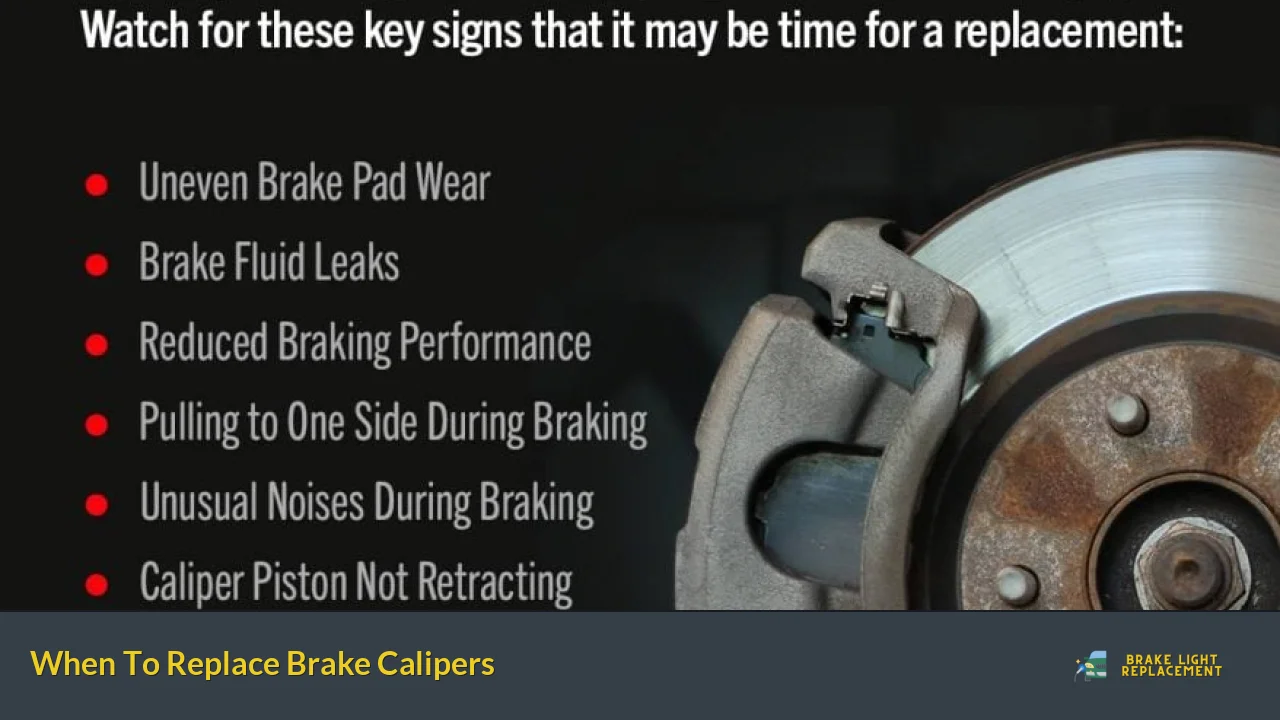Brake calipers are a critical component of a vehicle’s braking system, responsible for applying pressure to the brake pads against the rotors to slow down or stop the vehicle. Over time, these calipers can wear out or fail, leading to various issues that can compromise safety and performance. Knowing when to replace brake calipers is essential for maintaining a safe driving experience. This article will explore the signs that indicate a need for replacement, the factors that contribute to caliper failure, and practical steps to ensure your braking system remains in optimal condition.
Signs of Caliper Failure Potential Causes Uneven brake pad wear Sticking caliper or misalignment Fluid leaks Deteriorated seals or cracks in the caliper Soft or spongy brake pedal Air in the brake lines or fluid leaks Unusual noises during braking Worn-out pads or damaged calipers Vehicle pulling to one side Sticking caliper or uneven pressure distribution
Understanding Brake Calipers
Brake calipers function as clamps that squeeze the brake pads against the rotors when you apply the brakes. This action creates friction, which slows down the vehicle. Most vehicles use either floating or fixed calipers. Floating calipers move with the rotor and have pistons on one side, while fixed calipers are stationary and have pistons on both sides.
Calipers are designed to last a long time, often between 75,000 and 100,000 miles, but various factors can lead to premature failure. Regular maintenance and inspection are crucial for ensuring their longevity and functionality.
Signs That Indicate a Need for Replacement
Recognizing when your brake calipers need replacement is vital for maintaining safety on the road. Here are some key signs to watch for:
- Uneven Brake Pad Wear: If you notice that one brake pad is wearing down faster than others, it may indicate that a caliper is not releasing properly, causing constant friction on one side.
- Fluid Leaks: Brake fluid leaks around the caliper area can signal a failure in the seals or even cracks in the caliper itself. This can lead to reduced braking efficiency.
- Soft or Spongy Brake Pedal: If your brake pedal feels unusually soft or spongy, it may be due to air in the brake lines or fluid leaks caused by failing calipers.
- Unusual Noises: Squeaking, grinding, or clunking sounds when applying brakes often indicate worn-out pads or damaged calipers. These noises should not be ignored as they can lead to more significant issues.
- Vehicle Pulling to One Side: If your vehicle pulls to one side during braking, it may be due to a sticking caliper that is not applying even pressure across both sides of the vehicle.
Factors Contributing to Caliper Failure
Several factors can lead to brake caliper failure:
- Heat and Wear: Over time, heat generated from braking can weaken seals within the caliper, leading to leaks and reduced performance.
- Corrosion: Exposure to moisture and road salt can cause rust and corrosion on metal components of the brake system, including calipers.
- Contamination: Brake fluid can become contaminated with moisture or debris over time, which can damage internal components of the caliper.
- Lack of Maintenance: Insufficient inspection and maintenance can allow small issues to escalate into major problems requiring full replacement.
Maintenance Tips for Longevity
To extend the life of your brake calipers and ensure optimal performance, consider following these maintenance tips:
- Regular Inspections: Have your braking system inspected regularly by a professional mechanic. Look for signs of wear on pads and any visible damage to the calipers.
- Brake Fluid Changes: Change your brake fluid according to your vehicle’s maintenance schedule. Fresh fluid helps maintain hydraulic pressure and reduces contamination risks.
- Lubricate Moving Parts: Ensure that all moving parts of the braking system, including slide pins on floating calipers, are properly lubricated to prevent sticking and uneven wear.
- Monitor Brake Performance: Pay attention to how your brakes feel while driving. Any changes in performance should prompt an immediate inspection.
The Importance of Timely Replacement
Ignoring signs of failing brake calipers can lead not only to decreased braking efficiency but also pose serious safety risks. A malfunctioning braking system can result in longer stopping distances, increased wear on other brake components, and even complete brake failure in extreme cases.
If you suspect an issue with your brake calipers based on any of the signs mentioned earlier, it’s crucial to consult with a professional mechanic immediately. They can perform a thorough inspection and determine whether replacement is necessary.
FAQs About When To Replace Brake Calipers
- How long do brake calipers typically last?
Brake calipers generally last between 75,000 and 100,000 miles. - What are common signs of failing brake calipers?
Common signs include uneven pad wear, fluid leaks, soft pedals, unusual noises, and pulling during braking. - Should I replace both calipers at once?
It’s recommended to replace both calipers in pairs for balanced braking performance. - Can I drive with bad brake calipers?
No, driving with bad calipers is dangerous as it compromises braking efficiency. - What causes brake calipers to fail?
Factors include heat exposure, corrosion, contamination from old fluid, and lack of maintenance.
In conclusion, knowing when to replace your brake calipers is essential for maintaining safety on the road. Regular inspections combined with awareness of warning signs will help ensure that your vehicle’s braking system remains reliable and effective. If you notice any issues with your brakes, do not hesitate; consult a professional mechanic promptly.
